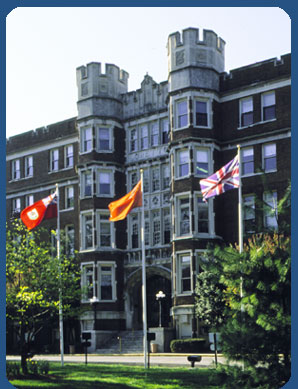| Women's Intellectual Contributions to the Study of Mind and Society Students, as part of an advanced seminar, examined and wrote about the lives of these women,
their intellectual contributions, and the unique impact and special problems that being female had
on their careers. |  |
| For information about referencing this paper - Click Here |
Jeanne Humphrey Block
Jeanne Humphrey was born in Tulsa, Oklahoma in 1923 to Charles and Louise Humphrey. When she was only a few months old, her family moved to Oregon. When her brother, Richard, was born in 1931, her family then moved to Milwaukee, Oregon. Her father was a building contractor and her mother was a housewife. Through the depression her parents used their resources wisely. They owned a milk cow and used their garden to feed the family (O'Connell, 1990).
Jeanne Humphrey attended Oregon State University. In 1942, she dropped out of college and joined the women's unit of the Coast Guard. At the end of the war, she returned to college at Reed College, majoring in Psychology. She graduated with honors in 1947. She then went to graduate school at Stanford and majored in clinical psychology. During her time at Stanford she met Jack Block, and in 1950 they married. In 1952, Jeanne Humphrey Block and Jack Block had their first child, Susan Dale. They had three more children: Judith Lynne, David Lewis, and Carol Ann (O'Connell, 1990).
During the 1960's, Jeanne Humphrey Block did research on factors predisposing children for asthma. In 1963, she received the Special Research Fellowship, from the National Institute of Mental Health. She became involved in marching and protesting against the Vietnam War. In 1968, with her husband, started a longitudinal study of personality development. The purpose of this study was to permit the developmental study of ego resiliency and ego control, the sex role development and gender differences, the study of self-percepts over time, and the study of parenting styles and their consequences. The study consisted of 130 children with the age ranging from 3-14. This study provided recognitions that greatly influenced her theoretical perspective (O'Connell, 1990).
In 1980, a television program on PBS, named NOVA, aired "The Pinks and the Blues." The hour long show focused on sex roles and featured Jeanne Humphrey Block, her thoughts, and the longitudinal study (O'Connell, 1990).
In May of 1981, she was diagnosed with pancreatic cancer. On December 4, 1981, the cancer took her life.
Radcliffe College then initiated the Jeanne Humphrey Block Fellowship. Each year it helps support female graduate students studying gender-related issues. The Dissertation Award Program awards one grant of up to $5,000 each year. More information about this can be found on Radcliffe's College website (Murray, 2002).
Jeanne Humphrey Block made significant contributions to the field of psychology, especially in the area of gender roles.
References
Back to Women's Page
